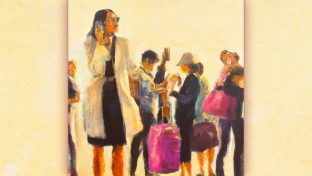Asian American Loneliness: How To Find A Sense Of Peace & Belonging

Asians and Asian Americans — like other ethnic groups out there — experience loneliness all the same, but for different reasons.
- Alienation, cultural gaps, generational gaps, and negative stereotypes can exacerbate feelings of loneliness in Asians and Asian Americans.
- Those of Asian descent are often (stereotypically) seen as being smarter, more highly educated, and more able to attain the best-paying jobs, which can evoke feelings of resentment in others, including their peers.
- The uptick in COVID-19-related hate crimes increased general distrust of Asians, wich further contributed to Asian American loneliness and isolation.
Struggling with loneliness or having a mental health crisis?
- Suicide Prevention Lifeline: 1-800-273-TALK (8255); Deaf or hard of hearing dial 711 before the number or connect via online chat
My mom is Asian and my father (now deceased) was Black.
When it comes to cultural loneliness, I was hit with a twofer, as I talked about in this article.
I grew up not only feeling like I wasn’t Black enough but that I wasn’t Asian enough, either.
Brings a whole new meaning to the phrase, “double-edged sword,” doesn’t it?
On the topic of Asian American loneliness, I can say pretty firmly that I’m part of this demographic.
I wish I could tell you that those emotions have lessened as I’ve gotten older but I’d be lying.
With the events going on in the world since the COVID-19 pandemic began, those feelings haven’t gone away.
And for other Asian Americans, they have actually gotten worse.
Why Asian Americans Experience Loneliness

One of the first things I noticed growing up — especially in school — was how “cliquey” the Asian kids were.
It was unmistakable to see the pools of students grouped together, clearly identifiable simply by the people surrounding them who looked, talked, and behaved like them.
In my young mind, it made sense because we tend to feel comfortable around people who look like us.
As I got older, I realized this also served another purpose: safety in numbers.
Loneliness in Asian Americans can occur due to:
- Alienation or feelings of “otherness”
- Generational age gaps between younger Asians and their older counterparts
- Cultural gaps between American-born Asians and relatives who were born and raised in their home country
- Being the target of negative stereotypes or resentments associated with one’s ethnicity
In the United States, Asians and Asian Americans have often been perceived as more “well off” compared to “Black and Brown” communities.
Oddly enough, this stands in stark contrast to the countless jokes and stereotypes relating to Asians.
The number of Asian-related tropes is so prevalent, that there’s even a list that’s been compiled as it relates to representation in the media, which has been going on practically forever.
Regardless of being the butt of many jokes, those of Asian descent are often seen as being smarter, more highly educated, and more able to attain the best-paying jobs.
Those qualities can be a source of resentment by other groups or individuals.
I’ve personally heard others (even within my own family) say that Asians were “riding on the coattails of white people” or were “white people in training.”
In many Asian cultures, there’s even the unspoken belief that “marrying white is right.”
Being likened to Caucasians, who are generally seen as having it all, can make Asian Americans feel a sense of disconnectedness from other ethnic groups.
Additionally, being resented by other groups one would ideally want to feel a shared bond with, can easily lead to feelings of loneliness as well.
Loneliness in Asian Americans is rooted more deeply than just the stereotypes they face, however.
Younger generations of Asian Americans fight for their own identities while combating the cultural expectations and traditions ingrained by their elders — who oftentimes were not born in the United States and now live there as expatriates.
The sense of discord on either side of this generational divide is enough to drive a wedge between families, causing unsettling feelings that include depression, anxiety, and — yes — loneliness.
On the flip side, more studies measuring loneliness in Asian populations are coming out, showcasing the negative impact these feelings have on the mental health of elderly Asian people.
No matter which side of the generational divide a person stands upon, loneliness is pervasive among the Asian and Asian American populations.
The feelings of isolation and loneliness during a pandemic are just as widespread — but for reasons that go far beyond the effects of living through quarantine.
How The COVID-19 Pandemic Impacted Loneliness Among Asian Americans
While the majority of the talking points mentioned above can be applied to other cultures, COVID-19 has propelled the concept of “Asian hate” into the spotlight over the last few years, further deepening feelings of loneliness and isolation.
The minute the phrase “Chinese virus” was uttered by then-President Donald Trump, I knew trouble was coming.
His influence over hatemongers in America was already at an all-time high.
You didn’t have to be a genius to understand why the consequences that followed those words played out the way they did.
Although I’m half Asian, I’m rarely identified as such based on my appearance.
Mixed race, sure, but not outright Asian.
My mother, on the other hand, is a different story.
Although she is Filipino, she’s very light-skinned and has oftentimes been mistaken for Chinese.
The moment the first news reports came out that Asians were being targeted because of Trump’s reference, my fears for my mother’s safety immediately ignited.
So did my concern for my Asian friends and those who are mixed-race and identifiable as Asian based on physical appearance.
I remember calling my mom and begging her not to go out at night anymore and to never go to the casinos by herself, especially when walking to her car in the parking garage.
Many if not most of us recall the Ring video that caught the brutal attack of an elderly Asian woman on the sidewalk in bright daylight in San Francisco.
A man walked right up to her, savagely beat her, and left her battered body on the ground, calling for help.
It made me want to vomit.
It still brings tears to my eyes even typing my recollection of that story. It was just f*cking awful.
We not only had a pandemic turning the world upside down, but Asians were also now the enemy and the source of blame for this “new normal” world full of masks, vaccines, and social distancing.
To be isolated because of a pandemic is one thing.
To also feel the need to remove oneself from society out of fear for your life based on how you look is quite another.
Ways To Deal With Loneliness As An Asian American

Despite the uptick in violence against people of Asian descent in recent years, there has been an almost immediate response not just from Asian communities but other ethnic groups, politicians, and celebrities.
It didn’t take long for #StopAsianHate to begin circulating on the social media scene, along with national television ads featuring notable Asian celebrities sharing their stories of representation and encouraging people to spread the word to stop the violence.
This goes to show that even in the darkest and loneliest of moments, there is light at the end of the tunnel.
If you’re suffering from loneliness, you don’t have to stay in the shadows.
Speak up and share your truth:
The most comforting way to feel less lonely is to know there are others out there who understand exactly what you’re going through.
#StopAsianHate has opened up the floodgates for people to begin sharing their personal stories, including the tough times.
Turning to social media to contribute your voice and story to the bigger conversation can be a very positive step towards building a connection with others, both online and offline.
I still remember my disbelief reading the Facebook posts of one of my friends, detailing the constant harassment she experiences being Chinese-American.
I had no clue that was a reality for her until she started sharing that side of her life online.
It made me feel closer to her and, honestly, even if her story was a random one I’d come across in my feed, I still would have felt a sense of connection based on her ability to be vulnerable.
The same holds true regardless of the source of your loneliness.
Speaking up and sharing your truth (about anything) allows others an opportunity to connect with you — and likewise, you with them.
Reach out for the help you need:
Suffering in silence with loneliness takes a huge toll mentally, emotionally, and physically.
There is no rule that says you have to keep all of your feelings to yourself.
In fact, you do yourself a huge disservice by failing to let others know you’re struggling.
There are countless resources available to help — along with therapy.
Virtual sessions are a great option for speaking with a mental health professional in the comfort and privacy of your own home.
Not ready to take the leap to talk to a therapist?
There are many organizations dedicated to helping people address whatever challenges they’re dealing with — including loneliness.
The National Alliance on Mental Illness (NAMI) is one such organization, whose website contains a directory where you can search by state to find local NAMI programs that could be a good match for your needs.
For example, the NAMI chapter of Massachusetts has a page on their website dedicated to Asian American and Pacific Islander support groups.
Many other organizations offer regional resources that are worth checking out, as well.
Be part of the solution going forward:
From volunteer groups that walk elderly Asian people to and from their appointments and help them run errands, to staged peaceful protests, there is no shortage of ways to get out of your comfort zone.
Volunteering can help you to create positive and genuine connections not just with others in your ethnic group but outside it as well, all as part of an effort to campaign for the greater good.
Change your mindset from victim to advocate:
Being able to reframe your reality from the perspective of a victim to someone committed to championing their community is a form of empowerment that can defeat any sense of disconnectedness.
While this won’t happen overnight, understanding your power as an individual and what you bring to the table in terms of your strengths, skills and personal story is an incredible way to validate your sense of self-worth.
That kind of mindset and energy will make people naturally gravitate toward you for all the right reasons while giving you an opportunity to connect with others.
It’s okay to break those family chains:
Is the cause of your loneliness due to your family structure and the expectations placed upon you?
Equip yourself with the means to break away from those toxic situations by identifying and setting goals that matter to you and make you happy, not your family.
Be prepared for pushback and some “courageous conversations.”
That’s entirely normal and to be expected.
Growth is hard but it’s not without its rewards — like living a life free from loneliness and missed opportunities for happiness.
Therapy or joining an online support group are great ways to acquire the tools and communication skills needed to know how to have those tough conversations with family and set yourself up for success.
You can also talk with those who have done it themselves — they’ll likely have valuable advice you can take to heart as you prepare.
Closing Thoughts
Asian American loneliness is very real and while its presence has grown since the pandemic began, it doesn’t have to be your reality.
At the end of the day, I’m proud of my Asian heritage and never hesitate to show support not just for my family but for my friends, loved ones, and colleagues from their respective Asian backgrounds.
That type of solidarity is powerful.
When you feel empowered and welcome that energy into your daily life, the last emotion to register on your list will be loneliness.
Editor’s Note: This article is part of The Roots Of Loneliness Project, the first-of-its-kind resource that comprehensively explores the phenomenon of loneliness and over 100 types we might experience during our lives.
Find Help Now
If you’re struggling with loneliness as an Asian American, we’ve put together resources to meet you wherever you are — whether you want someone to talk to right now, or are looking for longer-term ways to help ease your loneliness.
- Suicide Prevention Lifeline: 1-800-273-TALK (8255); Deaf or hard of hearing dial 711 before the number or connect via online chat
- Resources & Emotional Support For Loneliness
- Volunteer & Pet Adoption Opportunities






